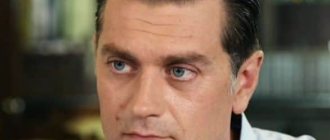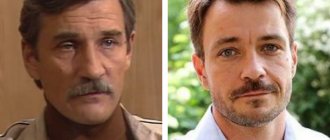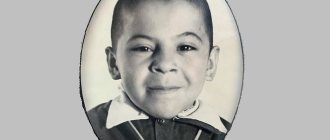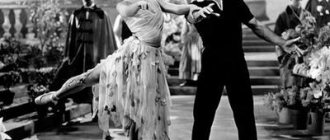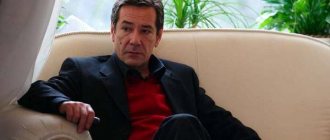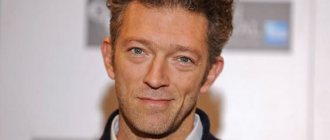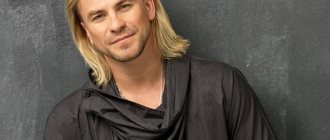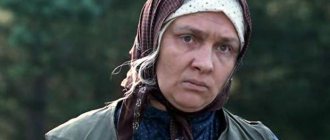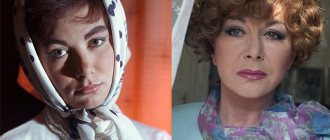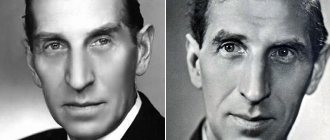Biography of Sergei Yursky
Sergei Yursky is a talented actor and director, a theatrical legend, who over his long career has had a hand in creating a whole host of diverse films. The versatility of his talent is amazing, because this outstanding master seems capable of absolutely everything. He acted in films, played in the theater, worked as a director, writer, and voice actor. And this is still not a complete list of his achievements! Sergei Yursky is a man with remarkable talent and an interesting destiny.
Actor and director Sergei Yursky
Directing
Over the years of his biography, Sergei Yursky has voiced dozens of feature films and cartoons. In addition, he wrote more than one script and published 3 books.
Since the early 70s, Yursky has repeatedly acted as a production director. He staged performances at the Mossovet Theater, the School of Modern Play and the Bolshoi Drama Theater. Gorky. In addition, the man took part in various television projects.
Sergei Yuryevich toured the CIS countries with concerts and performances until the end of his life. At the same time, he often read the works of Pushkin, Zoshchenko, Chekhov, Brodsky and other classics.
In his free time, Yursky himself wrote stories and composed poems, which he then read on stage.
Childhood and family
Sergei Yuryevich Yursky was born in Leningrad on March 16, 1935. His mother, Evgenia Mikhailova (nee Romanova), was a music teacher, and his father, Yuri Sergeevich, was a theater director, artistic director - at various times he directed a circus, a theater, was a drama and variety director, staged pantomimes, and played a little. The father of the future actor came from a noble family, and therefore after the revolution he was forced to change his surname from Zhikharev to Yursky.
Sergei Yursky in childhood
During the blockade, the family was evacuated to Uzbekistan, where Serezha went to first grade. In 1944, a cat appeared in the family, or rather, a circus cat, Ksyusha, and since then there has not been a period when there were no cats in Sergei Yursky’s house.
After the end of World War II, Yursky Sr. got a job as a director at the Moscow Circus on Tsvetnoy Boulevard. It was here, in the world of the circus backstage, that Sergei spent his childhood and youth. In those years, just like his father once did, the boy dreamed of connecting his life with circus art. He knew all the circus stars and animals by sight, and he remembered the circus acts by heart. What can I say, they essentially lived in a circus - the family was given two rooms in its building.
Sergei Yursky in his school years
After five years of living in Moscow, the Yurskys returned to Leningrad. In this city, Sergei graduated from school with a gold medal in 1952 and began studying law at Leningrad University. Already in his first year, he was captivated by the student theater, so after the third year of study, the young man broke with the law and entered the Leningrad Theater University, taking a course with Leonid Makariev. Sergey Yursky - Throwing board
Latest news about the actor
In the last years of his life, Sergei Yursky did not support the political line of the current government. Despite his advanced age, he, along with other artists, called on the president to stop military operations in Chechnya and solve the problem through peaceful negotiations.
He opposed the forced deportation of Georgian citizens from Russia, condemned ethnic discrimination and the deterioration of relations between the two states.
In 2007, Sergei Yuryevich signed an appeal to V. Putin, in which it was recommended that the president leave his post and, in general, leave politics.
Yursky condemned the actions of the Russian authorities in relation to Crimea, calling it a manifestation of national incivility. For which in 2015 he was noted by the Ministry of Culture of Ukraine as an actor who opposes aggression and supports the territorial integrity of the state.
Programs reading stories by M. Zoshchenko, A. Chekhov, V. Shukshin, as well as poetry by O. Mandelstam, A. Pushkin, B. Pasternak always attracted full houses. In addition, Yursky himself wrote poetry and prose. Sergei Yuryevich published a number of books with essays, stories, prose and poetry.
Among them, the artist’s poem “Everything Will Begin Later” stands out, which teaches not to put off solving vital issues until later. At creative evenings, so that the audience could rest a little, Yursky read “The Pensioners' Table,” which he did not consider a poem, but called a song or a toast.
Yursky shared his memories of friends who died but left a mark in people’s hearts in the book “The One I Love Isn’t Here.”
Tovstonogov Theater
All the teachers noted the mature performance of the talented actor beyond his years, and already in his second year Sergei began receiving offers from famous directors in Leningrad. This is how Sergei Yursky ended up in the troupe of the Bolshoi Drama Theater, which at that time was considered perhaps the most authoritative theater venue in the USSR. Under the guidance of director Georgy Tovstonogov, he performed many wonderful roles and served in his native theater until 1978.
Yursky connected his life with the theater of Georgy Tovstonogov (pictured left)
Among these, one of the most striking was the role of Alexander Chatsky in the play “Woe from Wit.” It was this acting work that put Yursky on a par with recognized theater figures, providing Sergei Yuryevich with new interesting roles. It is noteworthy that the censors, who generally recognized the performance as good, all the time clung to Chatsky - they called him “harmful” and saw in him “undermining the foundations.”
Sergei Yursky in the play “Woe from Wit”
“The Divine Comedy”, “Three Sisters”, “The Career of Arthur Ui”, as well as many other productions made the young actor a real star of the BDT, and also brought him the title of Honored Artist of the RSFSR in 1968. Here, at the BDT, he met his common-law wife Zina Sharko. In general, the actor later called this period of his life the happiest.
Young Sergei Yursky
Tovstonogov trusted Yursky’s talent and instincts. As the actor recalled, one day, in the late 60s, he brought the director Hemingway’s story “The Sun Also Rises,” adapted for the stage, with which Yursky was literally in love. Tovstonogov invited Yursky to stage the play himself, modestly adding: “If anything happens, I’ll help.” The trust was mutual - it was “his” director. And although the play “Fiesta” failed, Yursky remembered this experience for the rest of his life. Two years later, he made a television version of the play - “Fiesta”. At the same time, Yursky presented to the public his second directorial work, the play “The Chosen One of Fate” based on the play by Bernard Shaw, but it did not really suit the repertoire of the BDT. It was performed about 30 times outside the theater. Great interview with Sergei Yursky In the early 70s, friction began between Tovstonogov and Yursky. small, but enough to make the actor think. It all started with the fact that Tovstonogov took a second actor to play the role of Chatsky due to pressure from the authorities. Next, Yursky received the role of Khlestakov in the play “The Inspector General”. The public was delighted, but for some reason official criticism hated the actor. Feeling the hesitation of his ward, Tovstonogov suggested that Yursky forget the story of “Fiesta” and stage any performance of his choice. Sergei Yuryevich chose “Moliere” based on Bulgakov, directed and played the main role - Moliere. The performance, first shown in 1973, the year of the 300th anniversary of Moliere’s birth, was a resounding success with the public, but it was not allowed to be taken on tour even to other cities, let alone abroad.
Sergei Yursky in the play "Molière"
In the late 70s, the actor began to have problems with the authorities. He was summoned to the KGB, his name disappeared from all BDT posters, Lenfilm refused to cooperate. He was accused of supporting the “Prague Spring” (although the actor, on the contrary, stated that he did not see Soviet troops in Prague), communicating with the “socially dangerous element” Solzhenitsyn, and Yursky was not a member of the CPSU. He was forced to leave Leningrad and move to Moscow, however, in the capital, he was refused in several theaters, and was only reluctantly accepted into the Mossovet Theater.
Career
In one of his interviews, Yursky said that it was the theater that changed his whole life and influenced the fact that he did not go to work in the circus. While watching performances, he suddenly realized that on stage you can transform into different characters each time, living dozens, hundreds of new lives. And the work of a circus worker is simply improving already honed skills. And this thought captured him.
He realized that on stage you can transform into different characters each time
In his second year of studying at the theater, Yursky was invited to play at the Bolshoi Drama Theater. Gorky. Over the course of several years, he managed to become the leading actor in the troupe of theater director Tovstonogov. Sergei Yuryevich himself wanted to try himself as a director, staging a play based on Bulgakov.
Sergei Yursky had one interesting detail in his biography - nationality
Tovstonogov saw promise in him, but the party authorities in Leningrad were always too biased towards Yursky. They weren’t allowed up to the bureaucratic branch. Probably because Sergei Yursky had one interesting detail in his biography - nationality. Although he considered himself Russian all his life, Jewish blood flowed in the actor’s veins. Yursky's mother was Jewish. And Sergei Yuryevich himself said, jokingly, that he lived the fate of a Jew: either his family or he himself were persecuted, often remaining unrecognized.
He became a director, but only after moving to Moscow in 1978
Nevertheless, he became a director, but only after moving to Moscow in 1978. Here he got a job at the Mossovet Theater. He played in plays and staged his own plays.
Today Yursky is considered the most talented actor in Russian cinema. True, he did not play in films often. Many films with his participation were immediately condemned by the authorities after their release. Some have been collecting dust on the shelves of film studios for years. Nevertheless, he managed to win the love of the audience.
Today Yursky is considered the most talented actor in Russian cinema.
Fans of Sergei Yursky know his filmography and often review films with the participation of their favorite actor: “The Golden Calf”, “Look for a Woman”, “Man from Nowhere”, “Love and Doves”, “Republic of SHKID”, “The meeting place cannot be changed”, “Comrade Stalin” and many others.
For his services, Sergei Yursky was awarded a number of awards and prizes
For his services, Sergei Yursky, according to Wikipedia, was awarded a number of awards and prizes. Among them: “Golden Mask”, Prize of the Government of the Russian Federation, “Theater Star” and others.
Sergei Yursky in cinema
Although Yursky never considered himself a film actor - his heart belonged to the theater - he forever entered the annals of Soviet cinema. Sergei Yursky's debut in cinema came in 1957. It was the comedy “The Street is Full of Surprises” by Sergei Sidelev, the stars of which were Leonid Kharitonov and Evgeny Leonov. Yursky got a tiny role in the crowd - a passerby in a yellow hat.
Sergei Yursky's film debut
The first leading role went to Yursky in the comedy “The Man from Nowhere” (1961). He played a savage who was discovered by a geologist (Yuri Yakovlev) during an expedition and transported to Moscow. In his attempts to adapt to modern life, Jursky's hero goes through many adventures and meets love. Mikhail Suslov did not like the film and was banned until 1988.
Still from the film “The Man from Nowhere”
The next “high-profile” film role is the strict but fair director of the school for street children Vikniksor from “Republic of SHKID”.
Sergey Yursky in the "Republic of SHKID"
Having played the role of the famous schemer Ostap Bender in the film “The Golden Calf” (1968), Sergei Yursky instantly became popular in all corners of the USSR. This acting work was not the first cinematic role in Yursky’s career, but it was the one that brought him the greatest success. This masterpiece of cinema also starred Zinovy Gerdt, Evgeny Evstigneev and Leonid Kuravlev.
Actor Sergei Yursky as Ostap Bender
In terms of “recognizability,” the character of Yursky in “The Golden Calf” can only be compared with grandfather Mitya from Vladimir Menshov’s lyrical comedy “Love and Doves.” By the way, his “on-screen” wife, Baba Shura, was played by his wife Natalya Tenyakova.
Sergei Yursky in the film “Love and Doves”
In total, the talented actor played about fifty screen roles during his long life. He played Tsiolkovsky, Oppenheimer, and many other interesting characters.
Sergei Yursky in the film “The meeting place cannot be changed”
One can only envy such a rich filmography. Looking at the list of roles of Sergei Yursky, you understand that the numerous awards of this actor are not at all accidental. The Pushkin Medal, two orders “For Services to the Fatherland” (3rd, 4th degree), the Kinotavr festival award, as well as the title of People’s Artist of the RSFSR - all this is just a small fraction of the recognition that Sergei Yursky really deserves. Sergei Yursky - “Good Education” During his long life, he participated in scoring films and worked as a screenwriter. The actor also tried himself, and quite successfully, as a writer. Thus, his autobiography “The Game of Life”, a book of memoirs “Whom I love is not here”, dedicated to his loved ones who passed away: his father, Tovstonogov, Faina Ranevskaya, Evgeny Evstigneev and others, were published. He also wrote the collections of short stories “Who Holds the Pause” and “The Contents of the Box.” Yursky is the author of the entertaining book “I am a cat,” which, according to Sergei, was whispered to him by his cat Satik.
The actor's family always had cats.
Best films
Sergei Yuryevich's film career began in 1957. People watch films with the actor again and again. Viewers love all the images he created on television. But among them there are 5 most memorable.
Republic of ShKID, Viktor Nikolaevich Sorokin
Thanks to the role of the school director, the aspiring actor Sergei Yursky became famous throughout the Soviet Union. For a long time, the director of the film could not approve the script at Lenfilm, which was rewritten several times.
The management “recommended” that he take the famous artist Andrei Popov for the main role. But the director, by hook or by crook, ensured that Sergei Yursky played Vinsikor. The director believes that the film became a cult, and was watched by more than 17 million viewers, due to the brilliant performance of the young actor.
Golden Calf, Ostap Bender
In the struggle for the role of the strategist of all times, the artist beat out his more famous competitors at that time. To play Ostap Bender in the comedy “The Golden Calf,” Vladimir Basov, Vladimr Ilyin, Vladimir Vysotsky, Alexander Porokhovshchikov, and Zinovy Vyskovsky came to audition for Mikhail Schweitzer.
The director had doubts for a long time, reviewed the auditions more than once, and approved Sergei Yursky for the role. Ostap Bender in his performance is considered the best. This comedy was watched by more than 30 million viewers.
Look for the woman, Maitre Rocher
The owner of the notary office, the rude and demanding master Rocher, was played by Sergei Yuryevich. This is not the easiest role in this ironic detective story. The artist’s hero was remembered by the audience for a long time. The film is considered a classic of Soviet cinema, although the actor does not have the main role in this film.
The meeting place cannot be changed, Ivan Sergeevich Gruzdev
In the Soviet detective story “The Meeting Place Cannot Be Changed,” he was initially offered to play the role of Ruchechnik. After reading the script, Sergei Yuryevich asked the director to appoint him to the role of the accused of the murder of Gruzdev. He met halfway and did not regret it.
Many years later, the actor’s daughter accidentally met the son of the man from whom the famous Weiner brothers wrote Gruzdev. The young man told Daria that her father bears little resemblance to the prototype. But he praised how accurately he played a nervous man accused of murder. Yursky didn’t even suspect that Ivan Sergeevich had a prototype, so he was very surprised.
Love and doves, Uncle Mitya
The censors demanded that Vladimir Menshov completely cut out the drunkard Uncle Mitya, played by Sergei Yursky in the film “Love and Doves.” Because an anti-alcohol campaign has started in the country. The director refused to remove scenes with the actor from the film. Over time, the zeal of officials in the fight against alcoholism diminished. Menshov made minor adjustments, and the film was released. So that Sergei Yursky and Natalya Tenyakova could play their roles, they were well made up. At the time of filming in the film, the actor was barely 50 years old, and his wife was 41 years old.
Personal life of Sergei Yursky
Sergei's first common-law wife in his youth was actress Zinaida Sharko. The marriage with her lasted seven years, but later broke up due to unclear circumstances. After the breakup, Yursky moved with one suitcase of things to his friend Oleg Basilashvili.
In the photo: Zinaida Sharko
For the rest of his life, Sergei Yursky was married to another actress, Natalya Tenyakova, whom viewers probably remember from her role as Baba Shura in “Love and Doves.” They met on the set of the film “The Big Cat's Tale,” which can be considered a sign from above, because the actor simply adored cats.
Sergei Yursky and Natalya Tenyakova in their youth
In this marriage, their joint daughter was born - Daria Yurskaya, now an actress at the Moscow Art Theater.
Sergei Yursky with his wife and daughter
Writer
“Looking from the stage into the darkness of the auditorium, I always tried to imagine the face of my audience. And I once took up the pen because I wanted to address them in writing.” These appeals became books: novels and short stories, poems, memoirs and “literary anecdotes.” The talent of a storyteller is not divided into genres - spoken or written, when a person has something to tell. For example, as a child, little Seryozha saw Kuprin in a circus box. And if you list all the meetings during your colorful acting life... One of them is like sunstroke for Natalya Tenyakova.
Last years of life and death
In recent years, Sergei Yuryevich rarely acted in films. His latest roles: Stalin in the multi-part biographical drama “Comrade Stalin” and Boris Pasternak in the series “Furtseva”. Both series were released in 2011.
Sergei Yursky as Boris Pasternak
On the morning of February 8, 2020, the actor passed away in his apartment. The cause of death was cardiac arrest. In the last years of his life, Yursky was seriously ill, but did not want to advertise his health problems so as not to upset fans of his work. At the end of 2020, Sergei Yuryevich was hospitalized, but then, according to his relatives, it was a planned hospitalization.
Filmography
During his long creative biography, Sergei Yuryevich performed more than 50 film roles, although he did not consider himself a film actor. He played his first role in the comedy “The Street is Full of Surprises” by Sergei Sidelev. The actor was hired for an episode where he portrayed a passerby in a yellow hat.
Yursky was given the first leading role in 1961. Here he played a wild man discovered by geologists during an expedition and brought to Moscow. The actor's hero goes through a lot of trials and adventures and finds love. The film was released only in 1988.
In the mid-70s, Yursky often starred in the roles of fairy-tale and real aristocrats. One of them is Monsieur Jardin in the film “The Dervish Calls Paris.” This picture is national, the actor worked on the set with French and Azerbaijani artists.
All the characters, no matter what films he starred in, are multifaceted and interesting. In the 90s, Yursky continues to delight audiences. He is invited to the role of Master Rene in the popular television series “Queen Margot”, the Master in “Psychic”.
In the 2000s, he acted less frequently. He played Tsiolkovsky in the film “Korolev”, in the film “Fathers and Sons” he played Bazarov’s father. In the actor’s filmography, the role of Stalin in the film “Comrade Stalin”, in the series “Furtseva” Yursky played Boris Pasternak.


